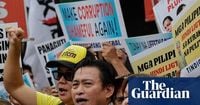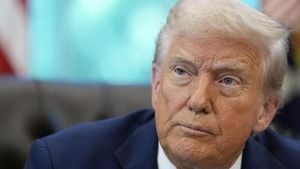On the eve of a historically charged anniversary, the Philippines stands at a crossroads, with public outrage over alleged corruption in government-funded flood control projects reaching a boiling point. The mood in Manila is tense as thousands are expected to pour into the streets on Sunday, September 21, 2025, for what’s been dubbed the “Trillion Peso March.” This mass demonstration reflects a groundswell of anger, not only at the billions allegedly siphoned from climate-related initiatives but also at the broader legacy of graft that has long haunted the nation’s political landscape.
The protest’s name is no accident. According to Greenpeace, an estimated $17.6 billion was skimmed from climate-related projects in 2023 alone—a staggering figure that has galvanized civil society and church groups to organize one of the largest demonstrations in recent memory. The timing is deeply symbolic: September 21 marks the anniversary of the imposition of martial law by Ferdinand Marcos Sr. in 1972, a move that ushered in years of authoritarian rule and, ultimately, his ouster amid widespread allegations of corruption. Now, more than five decades later, his son, President Ferdinand “Bongbong” Marcos Jr., finds himself at the helm, facing a nation once again united in protest against perceived abuse of power.
President Marcos Jr. has taken a notably different tack from his father, expressing public support for the protesters and their cause. During a press conference earlier this week, he said, “Do you blame them for going out on the streets? If I weren’t president, I might be out in the streets with them. Of course, they are enraged. They are angry, I’m angry. We should all be angry, because what is happening is not right.” As reported by The Guardian, his remarks struck a chord with many Filipinos, who see in them a rare acknowledgment from a sitting leader of the legitimacy of their anger.
This wave of discontent has not erupted in a vacuum. Over the past months, suspicions of “ghost infrastructure projects” have mounted, particularly after the president’s July state of the nation address, which spotlighted the issue amid weeks of deadly flooding. The sense that public funds meant to protect communities from disaster were instead lining private pockets has proven too much for many to bear. As the Philippine Star noted, both retired and active members of the Association of General and Flag Officers (AGFO) have lent their voices to the anti-corruption movement, calling such illegal acts a “direct and severe threat to national security.”
In a meeting at Malacañang Palace on September 19, 2025, AGFO members, alongside organizations such as the National ROTC Alumni Association, the Philippine National Police Academy Alumni Association, and the Confederation of National Unified Service Association, presented manifestos of support for the president’s anti-corruption efforts. Their statement was unequivocal: “We view corruption not merely as a matter of graft, but as a direct and severe threat to national security. When funds intended to protect our communities from national calamities are siphoned off by greed, it does not only steal from public coffers; it directly endangers lives, destroys livelihoods, displaces families, and erodes the people’s trust in the very institutions meant to serve them.”
The presence of high-ranking officials at the palace—Executive Secretary Lucas Bersamin, Special Assistant to the President Antonio Lagdameo Jr., Defense Secretary Gilberto Teodoro Jr., and Armed Forces Chief General Romeo Brawner Jr.—underscored the gravity of the issue and the administration’s commitment to addressing it. Yet, as the protests suggest, public trust remains fragile and hard-won.
The crisis deepened further when, on September 17, Martin Romualdez, the Speaker of the Philippine House of Representatives and a cousin of the president, announced his resignation. In a speech before the plenary, Romualdez explained, “The issues surrounding certain infrastructure projects have raised questions that weigh not only upon me but upon this institution we all serve. The longer I stay, the heavier that burden grows.” He continued, “I do this so that the independent commission on infrastructure may pursue its mandate freely and fully – without doubt, without interference and without undue influence.” Romualdez’s decision was widely interpreted as a move to allow a more transparent investigation into the allegations swirling around the legislature and the Department of Public Works and Highways.
Those allegations are serious indeed. Just last week, owners of a construction firm accused nearly 30 House members and officials in the Department of Public Works and Highways of accepting cash payments—a scandal that has only fueled the public’s fury. In response, President Marcos Jr. announced on September 15 that former Supreme Court Justice Andres Reyes would head a three-person commission tasked with investigating flood-control projects over the past decade. The hope, as articulated by the president and his allies, is that a thorough, independent inquiry will help restore faith in the system and hold wrongdoers accountable.
But Filipinos are not alone in their outrage. Across the region, frustration with government corruption and privilege has sparked similar movements. In Nepal, a Gen Z-led protest toppled the government earlier this month. In Indonesia, demonstrations forced the government to retract perks for lawmakers, and in East Timor, public outcry led to the scrapping of a plan to give lawmakers free SUVs. The Philippines’ Trillion Peso March is thus part of a broader regional reckoning with entrenched political privilege and the misuse of public funds.
What sets the Philippine protest apart is its deep connection to national memory and its resonance with past struggles for democracy and accountability. Many older Filipinos recall the original people-power movement that ended the Marcos dictatorship in 1986, while younger generations see in today’s demonstrations a chance to demand a better future. Civil society and church organizations have played a pivotal role in mobilizing support, echoing the cross-sector alliances that characterized earlier waves of protest.
As the nation braces for Sunday’s march, the stakes could hardly be higher. Will the government’s promises of accountability and reform be enough to satisfy the public’s demands? Can President Marcos Jr. navigate the legacy of his family’s past while charting a new course for the country? And, perhaps most urgently, will the billions allegedly lost to corruption ever be recovered and redirected to the communities that need them most?
For now, one thing is clear: the Philippines is once again at a moment of reckoning, with its citizens determined to hold their leaders to account and ensure that history does not repeat itself.




